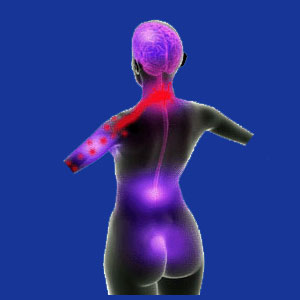
Brachial plexus pain syndromes are often enigmatic, since nerve conduction testing will likely show the involvement of the various nerves featured in this upper body neurological center, yet spinal sources of compression will typically be lacking. The brachial plexus is a concentration of nerve tissue which is composed of nerve roots from C5, C6, C7, C8 and T1. These neurological tissues are responsible for providing innervation for much of the upper body, including the shoulders, arms and hands.
This article will discuss various types of painful expressions which can originate in the brachial plexus and how these conditions should be evaluated for best treatment results.
Brachial Plexus Pain Locations
The brachial plexus is a super nerve center which provides motor and sensory signals to much of the upper body. Here are some of the many major muscles groups controlled by the brachial plexus tissues:
- Rhomboid muscles
- Pectoralis muscles
- Teres major
- Teres minor
- Latissimus dorsi
- Deltoid muscles
- Supraspinatus muscles
- Infraspinatus muscles
- Muscles of the hand
- Muscles of the arm
When the nerve tissues in the brachial plexus are affected, a wide range of symptoms can result, in both location and expression. This is because all these nerves are bundled together in such a small area that more than one nerve can be affected by any of the causative processes, including structural compression or regional oxygen deprivation.
Brachial Plexus Diagnoses
When the nerves in the brachial plexus suffer some pathological process, there can be many potential causes. Below are detailed the usual source processes which might explain symptomatic expressions:
Structural disc or bone issues can compress one or more of these nerves within the spinal canal or within the neuroforaminal spaces, before they reach the brachial plexus. Individual nerve roots can be compressed or chemically irritated in the lateral recess or neuroforamen by any of the usual causes, including disc pathologies, arthritic processes, atypical spinal curvatures or cervical spondylolisthesis.
Thoracic outlet syndrome is a general term for muscular compression of one or more of the nerves or blood vessels in the brachial plexus. This diagnosis is further classified into neurogenic, venous and arterial thoracic outlet syndrome.
Neurogenic symptoms are most common and usually involve a compressive neuropathy enacted by pressure or interaction by the scalene muscles.
Arterial and venous forms of thoracic outlet occur when a major vein or artery, usually the subclavian, is compressed by the same muscular structures. Some patients may suffer both types of nerve and circulatory thoracic outlet at the same time.
Summation of Brachial Plexus Pain
The nerve tissues of the brachial plexus are vital to normal physical functionality and sensation. When dysfunction occurs to the nerves or blood vessels in the region, patients may suffer minor or debilitating symptoms. Being that nerve tissues are highly sensitive, there is always the possibility that any significant brachial plexus condition might enact lasting or permanent nerve damage or scar tissue which might result in disability to one degree or another. Luckily, these circumstances are not commonplace and represent the extreme exceptions to the rule.
Since virtually all brachial plexus pain syndromes are neurological in nature, we strongly recommend seeking qualified care from a spinal neurologist. Remember to speak to your doctors about your diagnosis and the options you have for effective treatment. Be very careful about undergoing invasive care for any brachial plexus condition, unless the diagnosis has been confirmed by at least 3 specialists and the prognosis for a complete recovery is good. Many cases resolve without any medical care, although some take quite a bit of time to do so. Conservative care may help, depending on the type of symptoms occurring, with the most popular modalities being physical therapy, anesthetic injections, Botox, hydrotherapy, massage and chiropractic.
Neck Pain > Thoracic Outlet Syndrome > Brachial Plexus Pain





